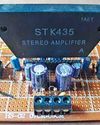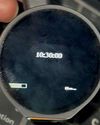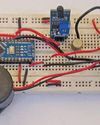
There has been interest in the motorsports industry to provide 5G connectivity for the cars on track. Typically, the cars use legacy technologies like Wi-Fi or digital video broadcast (DVB) to provide the connectivity for backhauling telemetry, video, and audio data from the cars back to the pit and media centre for broadcasting.
However, the current solutions provide a limited bandwidth, and throughput is in the range of 10 to 12Mbps. This throughput is insufficient for advanced use cases and capabilities like 4K streaming, 360-degree video, and telemetry for the racing cars.
The automotive industry is also moving towards a software defined vehicle (SDV) strategy, where the cars will need a highly reliable and low latency connectivity for frequent updates to the software, and to push gigabytes of data from the hundreds of different sensors on the cars. The move to electrification and softwarisation also needs a connectivity solution that is future-proof and ready for these requirements and remain relevant for the next decade.
Hence the option of using private 5G networks to provide connectivity for the motorsports industry cars is an attractive proposition. 5G is an option for the motorsports industry as it is designed to overcome and mitigate some of the issues involved in using wireless communications technologies for the motorsports use cases.
Proposed solution architecture
The figure on previous page shows the proposed ORAN disaggregated architecture for the motorsports use case. The solution uses the 7.2 split architecture, which is modular and extensible for the motorsports use case.
In this architecture, the distributed units (DUS) run some of the physical layer algorithms besides the radio link control (RLC) and media access control (MAC) layers. The DUS are housed in the track side units (TSU), which also provide the power for the DUS.
This story is from the {{IssueName}} edition of {{MagazineName}}.
Start your 7-day Magzter GOLD free trial to access thousands of curated premium stories, and 9,000+ magazines and newspapers.
Already a subscriber ? Sign In
This story is from the {{IssueName}} edition of {{MagazineName}}.
Start your 7-day Magzter GOLD free trial to access thousands of curated premium stories, and 9,000+ magazines and newspapers.
Already a subscriber? Sign In

STK435 IC-Based STEREO AMPLIFIER
This stereo AF amplifier uses the STK435 IC, a highly popular choice due to its simplicity.

A SEWER DRAIN SHIELD For Smart Cities
Drainage systems are vital for storm water management but often transport pollutants, especially plastics, to rivers and oceans, harming ecosystems.

ESP32 SPEECH FUNCTION: Text To Speech
Speech capability in technology primarily has two dimensions: text to speech (TTS) and speech to text (STT). This device focuses on TTS.

World's Smallest Programable INDUSPHONE DESIGN
This is the second part of designing the world’s smallest phone, where the UI is integrated with the basic functions of the phone.

FLAME-SENSING FIRE ALARM Using An Arduino Nano
Fire safety alarms are crucial in both residential and industrial environments.

loT-Based Distribution Transformer CONDITION MONITORING SYSTEM
The proposed IoT-based distribution transformer condition monitoring system enables real-time monitoring of distribution transformers, identifying such deviations as overload conditions and overheating.

Wi-Fi 6 AND Wi-Fi 7 Powering The Next Wave of Smart Connectivity
Wi-Fi 6 leads with faster data rates and reduced latency while upcoming Wi-Fi 7's backward compatibility will facilitate gradual upgrades from Wi-Fi 6, easing transitions. However, advanced features like multi-link operation (MLO) and ultra-low latency may command a premium, making Wi-Fi 7 suited for high-end applications.

CHARGE FORWARD: High-Voltage Batteries And MSMEs Can Fuel INDIA'S EV REVOLUTION
A nuanced explanation of low- and high-voltage EV batteries by Dr Gokhale, Vice President for Battery Technology at JSW Energy, illuminates their advancements and influence. The essential role of MSMEs and academia in developing a strong EV ecosystem emerges, marking their significance for India's push towards self-reliance in this innovative field.

"MILES TO GO Before I Sleep"
A teacher illuminates the path to success through the light of knowledge, yet some teachers extend that light to society through their contributions and research. Known as the architect of the modern M3 electronic voting machine (EVM) and the voter verifiable paper audit trail (VVPAT) that transformed India's democratic process, Prof. (Dr) Rajat Moona's journey began in the modest town of Bareilly. Here is his story, as recounted to and written by EFY's Yashasvini Razdan.

STARTUPS & INNOVATORS
1 One Charger To Charge All Your Devices | 2 Harnessing AI Technology For Efficient Pest Management | 3 Wireless Light-Based Communication With Velmenni's Technology